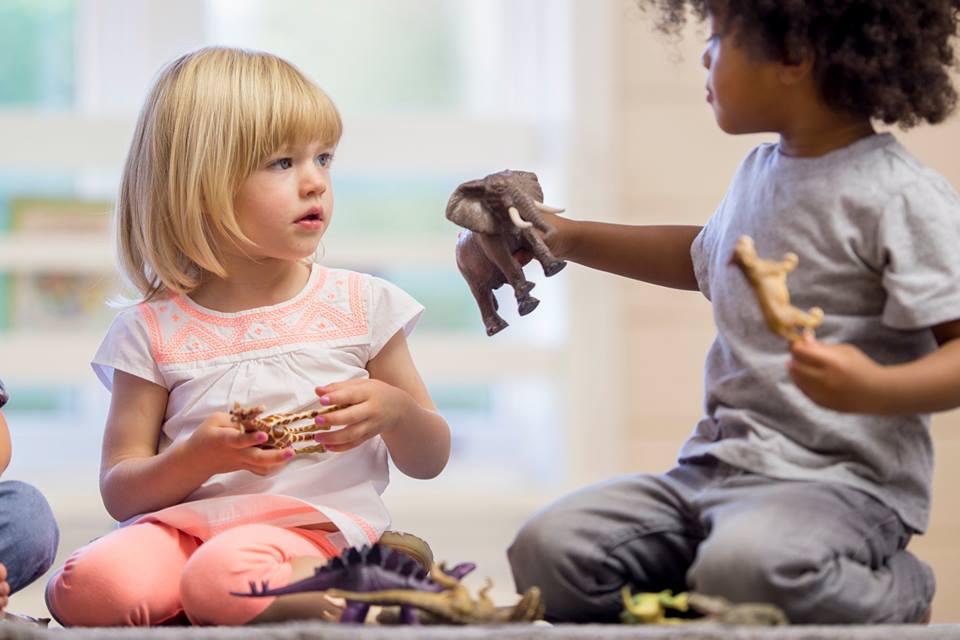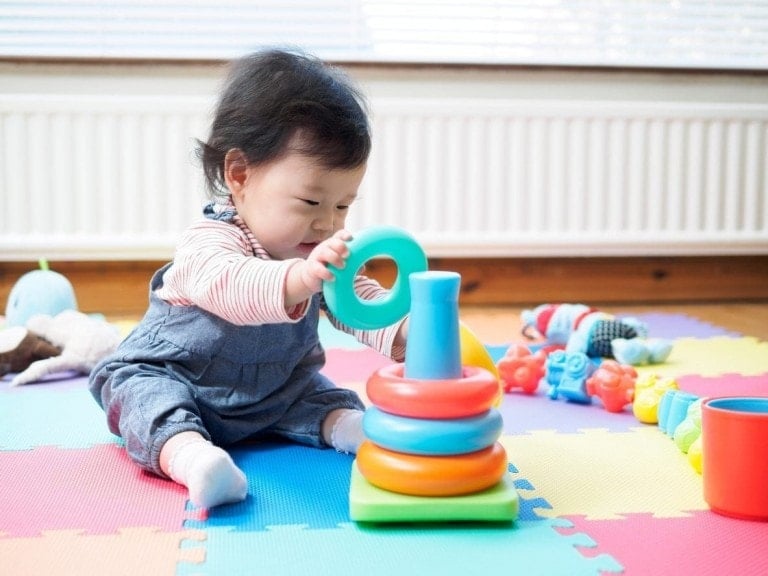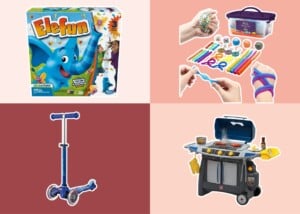“It’s mine!” If you have a toddler, you likely have heard this cry at some point (perhaps even several times per day). Many parents have been in situations where their child just flat-out refuses to share with their friends or play cooperatively. Teaching kids to share is tricky because toddlers go through a “gimmie” or “mine” phase.
Developmentally, kids don’t always understand why sharing is essential, and it requires several skills like waiting, patience, and managing big emotions before they learn the art of sharing.1 However, sharing and cooperation are essential, and there are ways you can encourage your toddler to develop these social skills.
Why Sharing Is Important
As grown-ups, we know the importance of teaching our kids to share; it helps them make and keep friends, cooperate to achieve shared goals, take turns, negotiate, and learn how to manage disappointment when things don’t go their way.1 It’s a vital social skill because learning to share helps us get along with others, develop strong and mutually beneficial relationships (if we give a little, we receive things in return), and essentially learn that sharing is caring.
Why Toddlers Struggle To Share
Toddlers struggle with sharing toys and other resources like food and attention because they have to sacrifice something, which is pretty hard on them emotionally. In part, it’s because they don’t fully understand the importance of learning to share (give and take) and that it doesn’t always mean permanently losing something if they share it. But it’s also because they haven’t yet figured out that if they give or share, they are likely to receive things back; although, if toddlers are playing together, both might find it hard to share or take turns.2 They also struggle with patience and might find it tricky to practice taking turns as they have difficulty waiting. Sharing also means your toddler needs to manage big feelings, a skill still emerging at this age, so tantrums and meltdowns are pretty common.3
When Is Sharing Developmentally Appropriate?
Sharing is a skill learned over time, and young children must master a few other skills before they are developmentally capable of sharing.
Toddlers
Toddlers might not share in a traditional sense, and it’s probably unrealistic to expect them to share and take turns consistently. However, we might see them starting to give resources to other people to reap the benefits. So they aren’t sharing because they are compassionate or understand that it can be reciprocal (i.e., I’ll get to take my turn soon or get something back in exchange). Instead, it’s more that they will receive some benefit from giving something away.4 So, toddlers might give a toy to their parents because they expect or want to receive praise in return, or they might share a cookie with a sibling to stop them from crying.
Preschool
Preschoolers are starting to understand rules or being fair and how this equates to taking turns or sharing. They might still struggle with doing this if it means giving up something or having difficulty waiting for their turn. They may also have trouble with empathy as they don’t always fully understand how or why others might feel a certain way (i.e., that person might be sad if I won’t let them have a turn on the swings). However, they may start identifying the social element and benefits of giving and receiving. They can better manage big feelings, and we can use words to reason with them or ask for their cooperation, so we start to see sharing become easier from age three onward.2,3
How To Teach Kids To Share
Although sharing is, in part, reliant on our children reaching certain developmental milestones, there are absolutely strategies we can use when teaching our kids to share. Activities for helping our preschoolers to learn about sharing should start at home.
Talk About It
Share your thoughts about taking turns and why sharing is positive, or acknowledge when you notice good sharing behavior so they can spot it happening and take note. For instance, saying something like, “Wow, your big sister did a great job sharing her toys with you. That was kind of her.” This can get them thinking about and noticing when people share (particularly what it feels like when someone shares with them).
Play Sharing Games With Them
This could be a simple board game or cooking, baking, and taking turns stirring the ingredients together. You could even put on a timer to practice taking turns swapping a toy back and forth.
Modeling, Sharing, and Taking Turns
Our little people are always watching us and learning how they should act by seeing how we manage situations. If you want your child to learn how to share, they will learn by seeing you share, cooperate, and take turns. They will also pick up on how you handle the challenge of doing this. For example, you might say, “It’s so hard to wait my turn, so I’m going to try and play with another toy while I wait,” or share how you manage or problem-solve to help deal with the situation.
Reading Books About Sharing
Reading together is a lovely way to get some quality time with your child, and books about sharing can also be wonderful tools for preschoolers. This is because they can see sharing and how characters in the book handle it. Reading is a non-confronting way of exposing children to situations and giving them knowledge or skills without them having to do it themselves yet. You could use the story as a jumping-off point to start a conversation about sharing, how tricky it can be, and how they can learn some skills to help them practice it.
Remember: Practice Makes Perfect
Our children need time and practice to get it right. So give them plenty of chances to practice sharing. If you do this at home, when they need to put this skill to the test in real life, they will have a better chance of doing it successfully.
Set Your Expectations
If you know there is a situation coming up where they need to share or take turns, communicate your expectations or boundaries before the event. For instance, “Okay, we are having your friend over for a play date. You have many favorite toys, but your friend will also want to play with them. So, if you have a toy you both want to play with, I can help you both take turns fairly.”
Manage Big Feelings
Sometimes, strong emotions arise when our kids don’t want to share. Helping them develop skills to manage big emotions can make it easier for them to take turns or allow others to play and share. If they are angry, you could help them shift some energy by jumping, stamping, singing loudly, or doing star jumps. You could also encourage calm breathing or other relaxation strategies. Or, if they are sad, you could help them identify ways to feel better — cuddling, reading a book, finding their favorite teddy, listening to music, etc.
Teaching our kids to share is an essential milestone in their development. However, it’s also important to understand that forced sharing can teach our children the wrong lessons. They can accidentally learn that children can interrupt and take what they want, that being loud or vocal means they get their needs met (i.e., can force someone else to give up their stuff), or even that grown-ups are in charge of sorting out who gets what and when. Instead of forcing them to share, focus on building their empathy and skills to manage big feelings and show them what sharing looks and feels like. It will have a much better impact on their desire to share. The result will be a child who can handle tricky social and emotional situations, as they have patience and empathy.



































